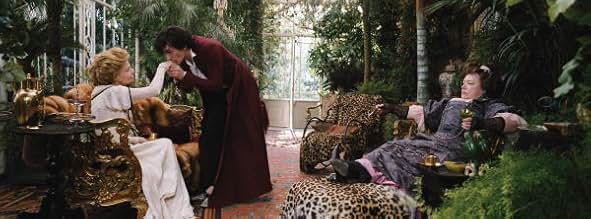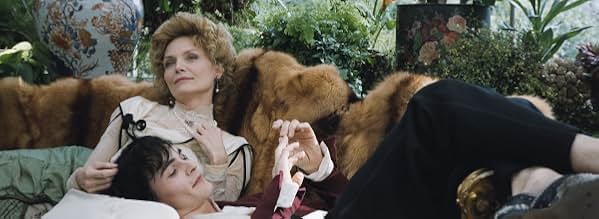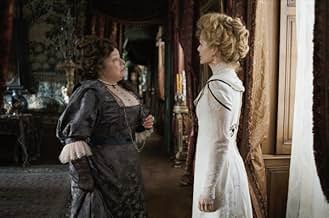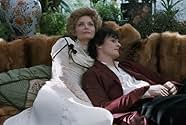एक दरबारी का बेटा बड़ी उम्र की महिला, जिसने उसे प्यार के तरीके सिखाए, के साथ अपने रिश्ते को समाप्त करने के लिए मजबूर होने के बाद एक काल्पनिक दुनिया में वापस आ जाता है.एक दरबारी का बेटा बड़ी उम्र की महिला, जिसने उसे प्यार के तरीके सिखाए, के साथ अपने रिश्ते को समाप्त करने के लिए मजबूर होने के बाद एक काल्पनिक दुनिया में वापस आ जाता है.एक दरबारी का बेटा बड़ी उम्र की महिला, जिसने उसे प्यार के तरीके सिखाए, के साथ अपने रिश्ते को समाप्त करने के लिए मजबूर होने के बाद एक काल्पनिक दुनिया में वापस आ जाता है.
- पुरस्कार
- 3 जीत और कुल 2 नामांकन
फ़ीचर्ड समीक्षाएं
The story is simple: courtesans in Paris must eventually retire form their lives of becoming wealthy through pleasing men of the higher class, and either they live out their lives in the luxuries of fluff or they must confront their aging and feel pangs of remorse as they end their lives alone, without a man to bolster them. Lea de Lonval (Michelle Pfeiffer) has been longtime 'friends' with Madame Peloux (Kathy Bates), even to the point of nurturing Madame's son Chéri (Rupert Friend) as he approaches manhood. Madame asks Lea to 'polish' Chéri for other women and after what might have been a brief fling in Normandy, the young Chéri and the aging Lea fall into a six year relationship. But as Madame realizes she needs grandchildren, she eventually finds a proper girl Edmee (Felicity Jones) for Chéri to marry. The remainder of the story is how these two age-disparate characters adapt to the 'social rules' of La Belle Epoque, suggesting that even under extraordinary circumstances the power of love is an issue that must be confronted.
Despite the performances by Pfeiffer and Friend (and even the miscast Bates) the story feels somehow sterile. Perhaps it is the out of place use of a male narrator who gives the film an unnecessary feeling of being a documentary, or the somewhat overused musical score of Alexandre Desplat, or the emphasis on costumes that hardly add to the beauty of Pfeiffer as Lea that keep the production grounded. It is a pleasant enough film, but hardly a memorable one. Grady Harp
One - do I feel any attachment and engagement in this story of Belle Epoque Paris where an extremely wealthy courtesan falls in love with the son of an extremely wealthy courtesan, a young man with apparently few redeeming features to his character ?
and
Two - This is a very well made and acted film - Michelle Pfeiffer is excellent, drawing me into the feelings of her character as the film progressed and Rupert Friend makes much of a role that I'm sure other young actors would have found too complex
In the end I settled closer to thought number two - this is a film with much to say about love and who we fall in love with.
I was fortunate to attend a screening of this film at which both the writer - Christopher Hampton & director Stephen Frears were present and enjoyed listening to them talk about the film, it's development and their hopes for it. Two very engaging characters who proved to be happy to answer all kinds of questions that we the Nottingham audience could throw at them
Colette's two novels about Chéri (Friend) the son of wealthy courtesan Madame Peloux (Kathy Bates), are not just about an indolent but beautiful rich slacker; they also follow the good fortune of Lea de Lonval (Pfeiffer), an unusually beautiful and profitable courtesan who has shrewdly prepared herself for financial comfort but forget the cardinal rule of prostitutes: Don't fall in love.
After six years of lover's paradise, Chéri and Lea part as the takes an arranged bride. And that's all there is, folks, as the film moves from a robust ramble about the various courtesans to a dreary hour of Twilight-like longing between this old-fashioned Harold and Maude. Director Steven Frears, who has had a fair share of intriguing films and characters, just lets the camera make love to Pfeiffer and Friend without fleshing out the characters to let is know what is so lovable to be longing for so long. Writer Christopher Hampton with Dangerous Liaisons and Atonement on his resume can't seem to muster a memorable line or develop his characters from flat clichés into round characters.
I do concede that Kathy Bates delivering this line saved the film for the moment: "Don't you find that when the skin is a little less firm, it holds perfume so much better?" Said to Michelle Pfeiffer, these lines give Bates bite of the year honors and a brief respite from spare, meaningless dialogue.
Kathy Bates is wonderful as Madame Peloux, a former competitor of Lea's—a woman who, if you squint hard (and catch the "portrait" of a younger Peloux) you can imagine having a gamine charm years before. Bates' acting moves effortlessly from laughing delightedly at smutty gossip to quickly assuming the pouting self-righteous expression of a disapproving mama as she discusses her son. From former courtesan to bourgeois matron in the blink of an eye. Bates carries this quick switch act off several times in the movie, and it's a pleasure to watch her skill at these rapid changes. The sets and costumes of Mme. Peloux, heavy 2nd Empire furnishings, stiff wired dressed with bustles, are beautifully contrasted with Lea's lighter look—slender, graceful, light. The clothes each character wears, and the styles of their respective homes, gives some subtext to the story. Mme. Peloux, a bit older than Lea, had her taste formed in an era of overdone stuffy pretentiousness, while Lea, a bit younger, has embraced the airy beauty of Art Nouveau.
The stultifying life of aging and former courtesans is well-depicted—unwelcome in respectable society they have to fall back on each other's company. Former competitors, they still can't help sniping at one another. Lea, as one of the youngest of the group, moves like a sylph among the faded charms of her cohort. One amazing scene: Among a bower of faded courtesans, one of them, a busty brassy red-head, cuddles and squeals like a teenager as she introduces her lover, a young man who's the son of one this woman's "official lovers." As she overwhelms the rather weedy young man with her caresses, the viewer can see Lea's discomfort—seeing the loud red-head and her boy lover seems like seeing a grotesque mockery of herself and Cheri.
Cheri, the title character, is played by Rupert Friend (Prince Albert in "The Young Victoria," and Mr. Wickham in the 2005 version of "Pride and Prejudice"). He's a young man who has only two responsibilities: marry, and manage the large amount of money his mother settles on him at his marriage. He's a young man without purpose, but finds love with Lea. What starts as a light-hearted affair turns into a relationship both Cheri and Lea need more than they realized. Lea and Cheri's affair ends—as does the wonderful era depicted in this gorgeous movie. The war ends Lea and Cheri's world. The 20th century starts with bleakness and hardness after the golden afternoon of La Belle Époque. We are indebted to Collette and Stephen Frears for showing us the loveliness, and even the artful decadence, of that time, and we are indebted to the talented cast for giving life to the "demi-monde" ("half-world") of that era.
The script is pretty nondescript in places. Pfeiffer has a few decent lines and still radiates enough screen presence to carry some scenes, and Bates matches her well. Most of the problems with this film are based on the male character Cheri (Friend). He is left with too little too late for us to care about his fate. lnstead he allows himself to have his opinions formed for him by his mother and and Lea who also does much of what passes for thinking on his behalf as well. He is married off to a woman he doesn't love, and then proceeds to drift between her and his lover without ever showing any real sense of commitment to either.
Due to the limitations of the script and his character, he comes across as only half formed, and too many scenes end with him staring blankly into the camera, looking quite vacuous, and a penny for his thoughts would be an understatement of inflation. lt is not easy to know which audience this movie is aimed at. It is not quite glamorous enough to be mainstream nor is it memorable enough to be art-house. As a result it meanders along without ever really being anything more than an exercise in self indulgence. That is a pity as l was expecting a fair bit more from those involved.
क्या आपको पता है
- ट्रिवियाWhen the project was in development during the 1990s, Jessica Lange planned to star as Léa de Lonval.
- गूफ़In the closing credits, 'thanks' are given to France's national railway, the Societe National Chemin de Fer, known as the "SNCF". However the credits have the letters out of sequence, calling it the "SCNF".
- भाव
Lea de Lonval: You came back here and you found an old woman. Yes, you found an old woman. Don't cry. Why are you crying? I'm so grateful to you. Were you really in love with me? Did you really think I was such a good person? If I had been a truly good person, I'd have made a man of you instead of thinking of nothing but your pleasure and my happiness. I wouldn't have kept you all to myself. Look at me. You're right. The qualities you lack, I expect it is my fault. But 30 years of easy living does make you very vulnerable. So no, I never did talk to you about the future. Forgive me. I loved you as if we were going to die the same day. I carried you in my heart for such a long time. I forgot you were going to have to carry your own burdens. A young wife. Perhaps even a child. And so you're going to suffer. You're going to miss me. And you're going to have to try to find enough wisdom and tolerance not to cause suffering to others. The thing is, now you've had a taste of youth. It's never satisfying, but you'll always want to go back for more. You must go. I love you. But it's too late. So get dressed. And go away now.
- इसके अलावा अन्य वर्जनThere are five different versions. Runtimes are: "1h 40m(100 min), 1h 26m(86 min) (United States), 1h 32m(92 min) (United States), 1h 32m(92 min) (Argentina), 1h 40m(100 min) (Berlin International) (Germany)".
टॉप पसंद
- How long is Chéri?Alexa द्वारा संचालित
- Is "Chéri" based on a book?
विवरण
- रिलीज़ की तारीख़
- कंट्री ऑफ़ ओरिजिन
- भाषाएं
- इस रूप में भी जाना जाता है
- Cheri
- फ़िल्माने की जगहें
- उत्पादन कंपनियां
- IMDbPro पर और कंपनी क्रेडिट देखें
बॉक्स ऑफ़िस
- बजट
- $2,30,00,000(अनुमानित)
- US और कनाडा में सकल
- $27,15,657
- US और कनाडा में पहले सप्ताह में कुल कमाई
- $4,05,701
- 28 जून 2009
- दुनिया भर में सकल
- $93,68,242
- चलने की अवधि1 घंटा 40 मिनट
- रंग
- ध्वनि मिश्रण
- पक्ष अनुपात
- 2.35 : 1
इस पेज में योगदान दें


































